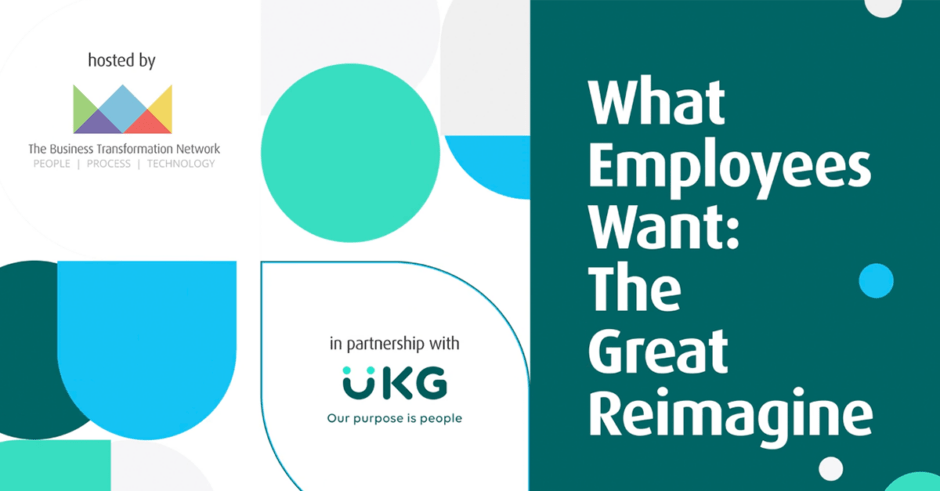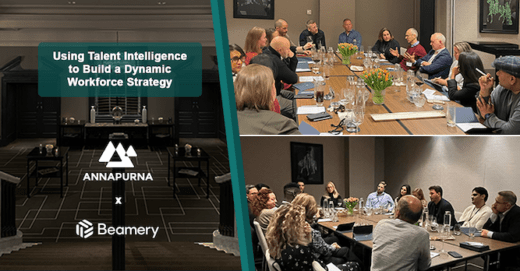Becoming a great place to work is the aim but how do we get there and what does that really mean for employees?
A consistent, yet more unique, employee experience is one that all employers are now aspiring to as employees are given the choice between home and/or office work. All employees are different, which lends to the importance of an embedded culture of hyper-personalisation to facilitate heightened engagement and bring continuous improvement to the employee experience.
The BTN was recently delighted to partner with UKG, for an exclusive roundtable with some of the leading people champions. The open and interactive session was hosted by Ben Gautrey (Managing Director at Great Places to Work), which brought about the following takeaways:
Creating a personalised experience for each employee is vital
The pandemic has forced the adoption of new ways of working for a large proportion of organisations. Companies must reimagine their work and the role of offices in creating productive, safe and enjoyable roles that are blended with their personal lives for their employees. For each organisation, how they work and the approaches they adopt differ from company to company. Organisations are now adopting many different ways of working for their employees which 12 months ago were not even thought about being implemented. For some, adaptive working has helped enable organisations to focus on not just where they work but how they work, allowing for greater flexibility and choice. It is key that organisations can build that sense of belonging when it comes to thinking about what is best for both their customers and employees, which according to some will say it simply comes down to listening.
The big shift is something that needs to become normalised and employees need to get used to it. It provides greater productivity, transparency and connectivity. However, it is essential to learn that you cannot treat everyone the same. Employees need to understand the importance of creating a personalised experience to ensure that not everyone is treated the same way. However, this can come with some challenges as a point was raised that you cannot create an employee experience that is tailored to just one person. As there are so many personas, this may not be the best option, whereas creating the right environment to help facilitate the personas to flourish will allow you to reap the rewards.
Employee experience is influenced by changing technologies
The pandemic has thrown a spotlight on technology as an enabler of work with many organisations turning to its use for flexible and remote working. As technology is constantly changing and evolving, the employee experience will ultimately be influenced by how much technological change is happening in the space. Increasing digitisation and technological advancements mean that organisations and people professionals must understand how workplace technology impacts their workforce if they are to drive and support the best outcomes for both their people and the business. One of the individuals around the table raised the point around the focus on certain employees who have specific needs, such as those that are neurodiverse. In these situations, technology is the biggest driver for those individuals as they want to complete tasks on their own or simply focus on technology alone rather than building relationships with other employees. Therefore the key is having the right environment for each individual.
It was also mentioned that when it comes to employee experience if you as a leader don’t have answers to employee experience, then letting go is important. If you are going to trust and empower the workforce, you cannot run the organisations with policies. You will need broader principles as a way to treat employees as individuals and learn different ways to improve the employee experience. Despite technology having huge drivers for this, managers are also just as important as they are the individuals you are in direct contact with and work with on a daily.
Manager capability and career opportunity are essential for employee experience
When it comes to improving employee engagement and performance, leaders must spend time working with the people who can deliver more impact than any other – managers. Showing higher manager capability increases the likelihood of both employee engagement and employee performance. It was mentioned that employee experience simply comes down to listening. How can organisations upskill a manager to listen more when it comes to creating psychological safety so that employees feel they can speak and communicate effectively with their leaders?
The point was raised that having employee experience surveys every quarter, at the very least, is key. This is because they can help track factors such as employee satisfaction and have direct impacts on improving employee engagement. In addition to creating feedback loops, organisations need to ensure they have a transparent career path. Individuals must have clarity on what steps they can take to further their career, or be asked if they actually want a career, along with the training and development opportunities that make it happen. This can also aid employers to become more engaged and have a clearer idea of positioning the right people in the right places to build growth.
The key to improving the employee experience is not just engagement, it has multiple factors whereby creating an inclusive, personalised and trust-building culture will help create career opportunities and facilitate employee satisfaction. The environment that employees can flourish in is just as important as the tools to help them grow.
About UKG
At UKG, our purpose is people. As strong believers in the power of culture and belonging as the secret to success, we champion great workplaces and build lifelong partnerships with our customers to show what’s possible when businesses invest in their people. Born from a historic merger that created one of the world’s leading HCM cloud companies, our Life-work Technology approach to HR, payroll, and workforce management solutions for all people helps more than 70,000 organizations around the globe and across every industry anticipate and adapt to their employees’ needs beyond just work.
To learn more, visit ukg.com.



